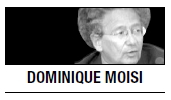When I heard the news about the assassination of the Russian politician Boris Nemtsov in Moscow, I was reminded of a conversation I once had with a Soviet dignitary before the fall of the Berlin Wall.
 We were walking alone in the park at Versailles, talking in general terms about the 20th century and its tragedies when my Soviet guest suddenly uttered something that has stayed with me ever since.
We were walking alone in the park at Versailles, talking in general terms about the 20th century and its tragedies when my Soviet guest suddenly uttered something that has stayed with me ever since.
“Russians have suffered more in this century than any other people,” he said. “During the First and Second World Wars, no other country suffered as many deaths as we did. But it was Soviet power, through a combination of purges and forced famines, that killed more of its children than all the enemies of Russia combined.”
The tragedy of Russia is that it poses as great a threat to itself as it does to its neighbors. As Europe faces off with Russian President Vladimir Putin over Ukraine, a larger and ultimately more important battle is taking place within Russia itself, one that pits the country’s rich culture against the cruel mendacity of its politics.
Given the nature of Putin’s regime, we will likely never know the truth behind Nemtsov’s murder. But it is impossible to contemplate the case without thinking that somehow, directly or indirectly, the path to assassination started near the Kremlin’s door.
Putin has expertly used an endless and highly professional barrage of propaganda to widen the gulf between the beliefs of most Russians and those of most Westerners. Indeed, official propaganda ― playing off deep strains of nationalism ― is the key that allows the Kremlin to foment a climate of jingoism and intolerance.
The power of Putin’s propaganda can be seen in the way it resonates far beyond Russia’s borders. During Soviet times, it was easy to understand how the communist ideal could seduce those of generous spirit, even if its promise of a just and free society ultimately turned out to be a lie. What is harder to explain ― beyond the crass financial and commercial interests of some ― is why so many in Western Europe demonstrate such an affinity for Russia today.
For some, it may be the allure of anti-Americanism, mixed with the defense of conservative values and the rejection of liberal “decadence” (for which exhibit A is the West’s growing social acceptance of same-sex marriage). Others may be searching for an ally in the face of a greater threat. Just as some in the West advocated cooperation with Nazi Germany against what they saw as the far more menacing Soviet threat, so today some support Putin as a partner against the danger of fundamentalist Islam.
Russia’s Western allies do not necessarily like the regime ― just as many of Germany’s supporters abhorred the Nazis ― but there seems to be no alternative. In tough times, according to this view, one cannot choose one’s allies. The result can be seen in the perfectly logical alliance between Europe’s populist parties ― for many of which the greater threat seems to be the European Union ― and Putin’s kitschy imperialism.
For now, in the struggle for the Russian soul, its venal politics seems to have the upper hand. But although the country remains mired in violence and fear, there are signs of light in the darkness.
In the immediate aftermath of the fall of the Soviet Union, I was lucky enough to meet young idealistic Russians like Nemstov. They believed in democracy and the rule of law and did not consider these values to be incompatible with Russian history and culture. In their enthusiasm and audacity, they reminded me of the young generals of the French Revolution. But the battlefields these young Russians were fighting on were in the realm of ideas, and their struggle was for freedom, not territory.
These young idealists may have lost many battles, but the war is far from finished. Their banners rose again, shortly after Nemtsov’s assassination, when tens of thousands of Russians took to the streets in protest. The forest of Russian flags provided a powerful symbol, a promise that another Russia was possible ― and may yet still be.
By Dominique Moisi
Dominique Moisi, a professor at L’Institut d’Etudes Politiques de Paris (Sciences Po), is a senior adviser at the French Institute for International Affairs and a visiting professor at King’s College London. ― Ed.
(Project Syndicate)



